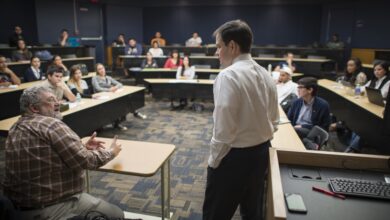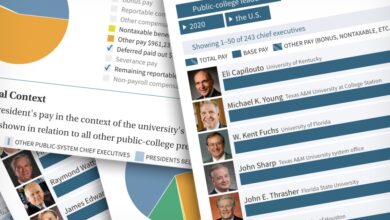Emporia State University Is Told It Can Fire Employees, Including Tenured Professors

[ad_1]
Emporia State University got permission on Wednesday to fire employees, including tenured professors, for any of a host of reasons, including “current or future market considerations.” Many faculty members there object that the plan essentially suspends tenure. The cuts have already begun.
The move was made possible by the Kansas Board of Regents. In January of last year, regents approved a policy that allowed the six state universities to suspend or terminate employees, including tenured professors, even if the institution had not declared financial exigency or initiated that process. The board wanted to give its institutions the flexibility they needed to deal with financial strain brought about by the Covid-19 pandemic, regents said at the time.
For a year and a half, no university acted on the policy. That changed this week. Emporia State submitted to regents a short “framework for work-force management” that sketches out the university’s criteria for cutting employees, some of which mirrors the policy’s language. Regents unanimously approved the framework at their Wednesday meeting. Before voting, Cynthia Lane, a board member, remarked that this “is a tool that should be used sparingly.”
Explaining why he believed the tool was necessary, Ken Hush, the university’s president, told the board that for years, the university had enacted traditional budget-cutting measures like hiring freezes, spending restrictions, and voluntary retirements. It’s been “death by a thousand cuts,” Hush said. But “that doesn’t work for us anymore, either programmatically or financially.” Expenses continue to rise, he said, as enrollment continues to decline. (According to a university spokeswoman, on-campus enrollment declined 24 percent between 2017 and 2021.)
“So what’s the choice? Charge students more? We don’t want to do that,” Hush said. “That has a Kansas families’ effect. Continue to cut costs, an approach we know doesn’t work? Continually passing the burden to students is a failure of our — ESU’s — previous strategies, and is no longer acceptable.” (Hush was named president of Emporia State in June. An unusual choice as he holds no advanced degrees, according to the student newspaper, he had served as interim president since November.)
According to the approved framework, the university can “suspend, dismiss, or terminate” employees based on factors “such as, but not limited to” low enrollment, cost of operations, reduction in revenues for specific departments or schools, current or future market considerations, restructuring, realignment of resources, performance evaluations, teaching and research productivity, and “low service productivity.” Affected employees can appeal to the state’s Office of Administrative Hearings. The burden of proof is on the employee, and “no discovery will be permitted,” the document says.
Hush told regents that about 7 percent of Emporia State’s work force will be affected. The vast majority of those employees will be allowed to remain at the university through May 2023 and will have the opportunity to receive three months of severance pay, he said in a campus email. (Gwen Larson, director of media relations, told The Chronicle in a written response to questions that because the regents’ policy expires on December 31, so does the university’s framework. All policies about program review and discontinuance, as well as about staff and faculty termination and tenure remain in place, she said.)
The university’s work-force realignment has been many months in the making, Hush told the board, and involved many people and groups on campus, including the faculty. In January, all faculty and staff members were told that the university was going to “assess every inch of how we operate today,” Hush said, adding that employees were asked for their insights on what would make the institution better.
But the Faculty Senate disagrees that professors were meaningfully consulted. The senate’s executive committee said that faculty members were given only two business days to respond to a draft of the framework. (Larson pointed out that the proposal is two and a half pages.)
“I think all faculty recognize that higher ed is changing,” said Brenda Koerner, a member of the executive committee. “I think a fair number of faculty recognize that some of that change is going to be painful. I think the biggest affront here is that faculty weren’t involved… in the process at all.” Faculty members, she added, “are always willing to see how we can adapt our programs to meet students’ needs.”
Many Emporia State professors also take issue with the termination criteria themselves, which the executive committee called “broad, vague, and ill-defined.” “If the termination of employees, especially tenured faculty, is indeed strategic, that strategy should be transparent,” the committee wrote in a response to the draft. Ultimately, the process will prompt good faculty members to leave, “especially at a time when faculty morale is so low.”
Larson told The Chronicle that the new framework “is a policy that provides guidance to determine programs that we will move away from. For some, that may seem vague.”
The framework seems to run afoul of standards set by the American Association of University Professors, said Mark Criley, a senior program officer there. When an institution is going through a financial crisis, Criley said, the faculty must first be involved in determining if it’s bad enough that the educational mission is threatened and if less drastic steps than terminations can be taken. If not, the faculty, by virtue of its expertise, needs to have “a primary role in making decisions about the future of the institution’s academic mission.” A university that excludes the faculty from those determinations puts that mission at risk, Criley said.
It’s not clear which programs will be shuttered or who will be let go. In a September 7 email to campus, Hush identified programs, such as nursing, business, and biology, as ones with which the university will “align our resources.”Hush said in a Wednesday campus email that affected employees will be informed by Friday to provide “the most advance notice possible.”
Not long after Koerner, who is a tenured faculty member in biological sciences, got off the phone with The Chronicle, she got another call. She was summoned to a late Thursday-morning meeting with Thomas, the interim provost. She already knew what was coming.
Koerner was told she won’t have a job at Emporia State come mid-May. She was given a boilerplate letter that listed the factors from the new policy.
Koerner is not sure what she’ll do next. She has worked at Emporia State since 2005. It was her first job out of graduate school. It’s possible, she said, that she’ll leave higher ed altogether.
Right now, she said in a text message, she feels underappreciated and drained. She told her students she won’t be in class tomorrow. She’s taking the day off to process the news.
[ad_2]
Source link






